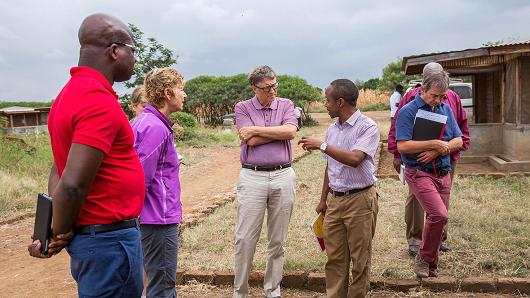
Sam DeLeo | Gates Foundation
Sue Desmond-Hellmann in Tanzania with Bill Gates. Desmond-Hellmann is an Advisory Board member for Healthy Returns.
When you are lucky enough to work in global health and development, you get to witness some of humankind’s greatest achievements. Yet often, the most inspiring success stories are also the ones most overlooked.
Here are just a few of the milestones reached in 2017 that didn’t make big headlines: We’ve seen the greatest ever use of contraceptives in the developing world, meaning . We’ve witnessed the strongest call for gender equality in decades, with women driving changes to cultural and social norms around the world. And we’ve had the fewest cases of polio ever —in 1988, there were 20 cases every half-hour, in 2017 there were fewer than 20 all year.
There are many reasons behind these remarkable achievements, from the expertise of scientists and innovators, to the determination of activists and campaigners, who not only see the possibilities but are dedicated to making them realities. But one important factor that often goes unnoticed is the collaboration between the public, private and philanthropic sectors—an indispensable nexus in saving and improving lives.
Take neglected tropical diseases (NTDs), which affect one in five people in the world and cause death, disability, and disfigurement. In January, our partners achieved a Guinness World Records title for the most drugs donated in a day—more than 207 million doses. Since 2012, more than 7 billion drugs have been donated and delivered to treat NTDs in one of the largest and most effective health interventions in the world.
Pharmaceutical companies have been the engine of this progress. Beyond donating drugs, the industry has joined forces with academia and public organizations to explore innovative new ways to combat disease, including new diagnostics that reduce costs, get patients treated faster and use scarce resources more efficiently.
Then there are measures to prevent a global pandemic. We don’t know what epidemic will come next, who it will affect, or how long it will last. What we do know, is that there will be one. Yet we are woefully unprepared. As my boss Bill Gates says, of all the things that could kill more than 10 million people around the world, the most likely is an epidemic.
 EU News Digest Latest News & Updates
EU News Digest Latest News & Updates


